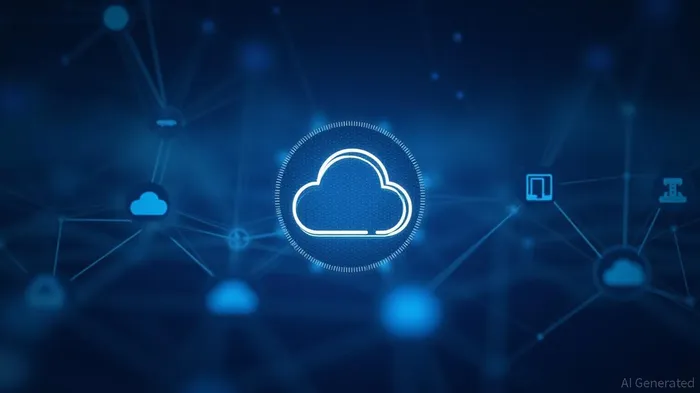OpenAI Expands Cloud Partnerships with Google for ChatGPT, Diversifying Computing Resources
ByAinvest
Wednesday, Jul 16, 2025 9:54 pm ET1min read
AMZN--
The decision to diversify its cloud partners comes amid reports of strained relations between OpenAI and Microsoft. Initially, Microsoft held an exclusive cloud partnership with OpenAI, but this has evolved, with Microsoft naming OpenAI as a competitor in the cloud space. The new arrangement allows OpenAI to spread its computing workload across multiple providers, addressing the surge in global AI usage and the limitations of relying on a single cloud vendor [1].
OpenAI's decision to expand its cloud partnerships underscores the immense computing demands of large language models like ChatGPT. These models require substantial global infrastructure to operate at scale, and the addition of Google Cloud signifies a tactical move to meet this demand. The arrangement appears more additive than competitive, with OpenAI's substantial computing appetite necessitating capacity from nearly every major vendor [2].
Google's addition to OpenAI's supplier list reinforces the broader industry trend of multi-cloud architecture, particularly among firms at the cutting edge of AI development. This approach allows for more flexibility, redundancy, and cost optimization. By leveraging Google's cloud infrastructure, OpenAI can ensure that its services remain robust and accessible across multiple geographic regions, including the U.S., Japan, the Netherlands, Norway, and the United Kingdom [1].
The move also aligns with Google's broader strategy to strengthen its cloud business. Google Cloud has been investing in expanding its global footprint, including investments in Germany and the Netherlands. These efforts aim to bolster its cloud and AI capabilities, positioning Google to compete more effectively with established hyperscalers like AWS and Microsoft Azure [3].
In conclusion, OpenAI's expansion of cloud partnerships, including the addition of Google Cloud, reflects its growing demand for computing resources and a strategic shift towards a multi-cloud architecture. This move not only benefits OpenAI but also contributes to the growth and diversification of the cloud market, particularly for Google's cloud business.
References:
[1] https://www.cnbc.com/2025/07/16/openai-googles-cloud-chatgpt.html
[2] https://www.investing.com/news/stock-market-news/openai-enlists-google-cloud-to-power-chatgpt--cnbc-4138380
[3] https://ca.finance.yahoo.com/news/openai-enlists-google-cloud-power-203807102.html
CRWV--
MSFT--
ORCL--
OpenAI has expanded its cloud partnerships, adding Google to its list of service providers for running ChatGPT. The collaboration will utilize Google's cloud infrastructure, alongside resources from Microsoft, CoreWeave, and Oracle. This move is a significant boost for Google's cloud business, which is smaller and newer compared to Amazon and Microsoft.
OpenAI has bolstered its cloud infrastructure by adding Google Cloud as a key service provider for its popular ChatGPT artificial intelligence assistant. The collaboration will utilize Google's cloud resources alongside those from Microsoft, CoreWeave, and Oracle. This strategic move is a significant win for Google's cloud business, which is relatively smaller and newer compared to Amazon Web Services (AWS) and Microsoft Azure.The decision to diversify its cloud partners comes amid reports of strained relations between OpenAI and Microsoft. Initially, Microsoft held an exclusive cloud partnership with OpenAI, but this has evolved, with Microsoft naming OpenAI as a competitor in the cloud space. The new arrangement allows OpenAI to spread its computing workload across multiple providers, addressing the surge in global AI usage and the limitations of relying on a single cloud vendor [1].
OpenAI's decision to expand its cloud partnerships underscores the immense computing demands of large language models like ChatGPT. These models require substantial global infrastructure to operate at scale, and the addition of Google Cloud signifies a tactical move to meet this demand. The arrangement appears more additive than competitive, with OpenAI's substantial computing appetite necessitating capacity from nearly every major vendor [2].
Google's addition to OpenAI's supplier list reinforces the broader industry trend of multi-cloud architecture, particularly among firms at the cutting edge of AI development. This approach allows for more flexibility, redundancy, and cost optimization. By leveraging Google's cloud infrastructure, OpenAI can ensure that its services remain robust and accessible across multiple geographic regions, including the U.S., Japan, the Netherlands, Norway, and the United Kingdom [1].
The move also aligns with Google's broader strategy to strengthen its cloud business. Google Cloud has been investing in expanding its global footprint, including investments in Germany and the Netherlands. These efforts aim to bolster its cloud and AI capabilities, positioning Google to compete more effectively with established hyperscalers like AWS and Microsoft Azure [3].
In conclusion, OpenAI's expansion of cloud partnerships, including the addition of Google Cloud, reflects its growing demand for computing resources and a strategic shift towards a multi-cloud architecture. This move not only benefits OpenAI but also contributes to the growth and diversification of the cloud market, particularly for Google's cloud business.
References:
[1] https://www.cnbc.com/2025/07/16/openai-googles-cloud-chatgpt.html
[2] https://www.investing.com/news/stock-market-news/openai-enlists-google-cloud-to-power-chatgpt--cnbc-4138380
[3] https://ca.finance.yahoo.com/news/openai-enlists-google-cloud-power-203807102.html

Stay ahead of the market.
Get curated U.S. market news, insights and key dates delivered to your inbox.
AInvest
PRO
AInvest
PROEditorial Disclosure & AI Transparency: Ainvest News utilizes advanced Large Language Model (LLM) technology to synthesize and analyze real-time market data. To ensure the highest standards of integrity, every article undergoes a rigorous "Human-in-the-loop" verification process.
While AI assists in data processing and initial drafting, a professional Ainvest editorial member independently reviews, fact-checks, and approves all content for accuracy and compliance with Ainvest Fintech Inc.’s editorial standards. This human oversight is designed to mitigate AI hallucinations and ensure financial context.
Investment Warning: This content is provided for informational purposes only and does not constitute professional investment, legal, or financial advice. Markets involve inherent risks. Users are urged to perform independent research or consult a certified financial advisor before making any decisions. Ainvest Fintech Inc. disclaims all liability for actions taken based on this information. Found an error?Report an Issue

Comments
No comments yet